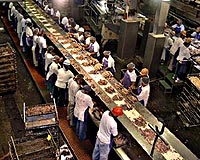 |
Paris (AFP) Nov 17, 2010 A yardstick for estimating ocean fish stocks, many of which are under intensifying pressure from industrial trawling, is badly flawed, a study released Wednesday said. As a result, global stocks of some commercially valuable top predators -- including certain species of tuna, sharks and halibut -- may be closer to collapse than thought, it warned. Since the late 1990s, scientists and regional management organisations have used catch data to measure changes in the balance of species across so-called "trophic levels." The trophic level is the species' rank in the food chain. Microscopic sea algae have a trophic level of one, while large predators such as sharks or tuna are at the highest level, four. Proportional changes within this ranking have been used as the indicator of how well a particular species is faring. If, for instance, a species of "Trophic Four" fish was in disproportionate decline compared with "Trophic Three" fish on which they feed, this would likely indicate overfishing. The method presumes that humans "fish down the food web" by over-harvesting fish at the highest levels and then sequentially going after fish further down the chain. But the new study says this technique is not smart enough. "Applied to individual ecosystems, it's like flipping a coin -- half the time you get the right answer and half the time you get the wrong answer," said Trevor Branch, a University of Washington professor. "This is important, because that measure is the most widely adopted indicator by which to determine the health of marine ecosystems." The method's shortcomings are illustrated by the case of the Gulf of Thailand, according to the paper, which appears in the journal Nature. The average trophic level of what is being caught is rising -- and this in principle should indicate improving ecosystem health. But it turns out that fish at all levels have declined by about tenfold since the 1950s because of overharvesting. This disastrous drop is masked because the "trophic level" system is based on looking at the top predators first, say the authors. But in the Gulf of Thailand, industry first targeted mussels and shrimps near the bottom of the food web before shifting to predators higher up, says the study. When the researchers compared the catch-based method with a more accurate one, based on trawling over a long period of study, the results differed sharply in 13 out of the 29 ecosystems they evaluated. Applying both methods to worldwide data, the scientists say industrial fishing over the past decades has not simply worked its way downwards from the top of the food chain -- it has gone upwards, too. "Globally we're catching more of just about everything," Branch said. Relying on changes in the average trophic level of fish being caught "won't tell us when fishing is sustainable or if it is leading to collapse." Scientists not involved in the study said the findings could revolutionise the way fish populations are measured. "This study makes clear that the most common indicator, average catch trophic level, is a woefully inadequate measure of the status of marine fisheries," said Henry Gholz, an environmental biologist at the US National Science Foundation.
Share This Article With Planet Earth
Related Links Water News - Science, Technology and Politics
 Bluefin tuna showdown pits industry vs. ecology
Bluefin tuna showdown pits industry vs. ecologyParis (AFP) Nov 17, 2010 Economy clashed with ecology as dozens of nations met in Paris Wednesday to set catch quotas for diminished stocks of Atlantic bluefin tuna, a mainstay of gourmet sushi and sashimi in Japan. The 10-day meeting of the International Commission for the Conservation of Atlantic Tunas (ICCAT) seeks a compromise between ensuring the species' future and salvaging a multi-billion-dollar business spr ... read more |
|
| The content herein, unless otherwise known to be public domain, are Copyright 1995-2010 - SpaceDaily. AFP and UPI Wire Stories are copyright Agence France-Presse and United Press International. ESA Portal Reports are copyright European Space Agency. All NASA sourced material is public domain. Additional copyrights may apply in whole or part to other bona fide parties. Advertising does not imply endorsement,agreement or approval of any opinions, statements or information provided by SpaceDaily on any Web page published or hosted by SpaceDaily. Privacy Statement |